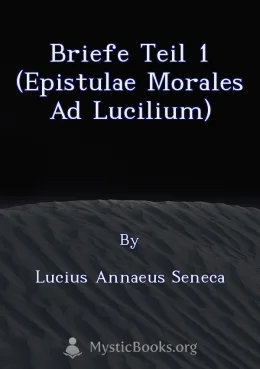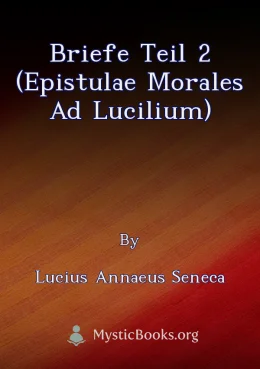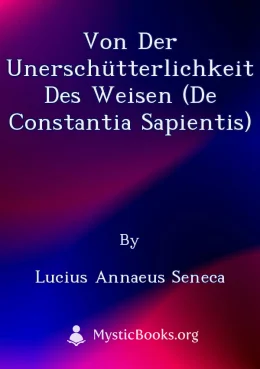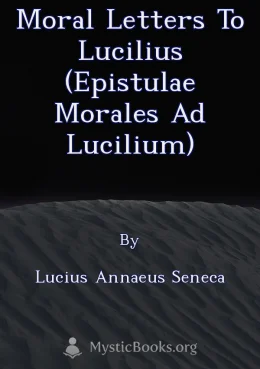
Title
Country/Nationality
Lucius Annaeus Seneca
Books by Lucius Annaeus Seneca

Trostschrift an Marcia
Lucius Annaeus Seneca (4 v. Chr.–65 n. Chr.) gibt stoische Grundsätze zum Tod und zur Trauer. Übersetzung durch Albert Forbiger (1798-1878) von 1867. (Zusammenfassung von redaer)

Vom glückseligen Leben
Vom glückseligen Leben is a stoic guide to living a happy and fulfilling life. It was written by the Roman philosopher Lucius Annaeus Seneca in the 1st century AD. The book is divided into three parts: the first part discusses the nature of happiness...

Von der Kürze des Lebens
"On the Shortness of Life" by Seneca is a philosophical treatise that explores the nature of time and how we can make the most of our limited time on earth. Seneca argues that we often waste our time on trivial pursuits and that we need to focus on w...

Trostschrift an seine Mutter Helvia
In dieser Schrift tröstet Lucius Annaeus Seneca, der Jüngere, seine Mutter Helvia über seine Verbannung nach Korsika. Seneca, ein römischer Philosoph und Staatsmann, der in Ungnade gefallen war, erkundet in diesem Brief die Prinzipien des Stoizismus...

Über den Zorn
In "Über den Zorn", Seneca, ein römischer Philosoph und Anhänger des Stoizismus, erörtert die Natur und die Bewältigung von Zorn. Er argumentiert, dass Zorn ein Zeichen von Schwäche ist und dass wahre Stärke in der Fähigkeit liegt, die eigenen Emoti...

Briefe Teil 1 (Epistulae morales ad Lucilium)
Senecas *Briefe an Lucilius* sind eine Sammlung von 124 Briefen, die sich mit philosophischen Themen befassen, insbesondere mit dem Stoizismus. Seneca richtet diese Briefe an seinen Freund Lucilius und vermittelt ihm seine Ansichten zu Themen wie Glü...

Briefe Teil 2 (Epistulae morales ad Lucilium)
Senecas "Briefe an Lucilius" sind eine Sammlung von 124 Briefen, in denen der römische Stoiker Seneca dem jungen Lucilius seine Philosophie erläutert. Dabei behandelt er Themen wie Glück, Tugend, Vernunft, Umgang mit Leid und Tod, sowie die Bedeutung...

Von der Gnade - An den Kaiser Nero (De Clementia)
In "De Clementia" (On Clemency), Seneca, a Roman Stoic philosopher and advisor to Emperor Nero, explores the concept of clemency as a virtue of good governance. He argues that true power lies not in cruelty or dominance, but in the ability to forgiv...

Von der Unerschütterlichkeit des Weisen (De Constantia Sapientis)
In "Von der Unerschütterlichkeit des Weisen (De Constantia Sapientis)", Seneca explores the concept of stoic wisdom and its role in achieving true tranquility amidst life's inevitable challenges. He argues that the wise person is not immune to hardsh...

Von der göttlichen Vorsehung (De Providentia)
In "On Divine Providence", the Roman philosopher Lucius Annaeus Seneca addresses the question of why bad things happen to good people. Seneca argues that the universe is governed by a divine providence that ultimately works for the good of all, even...

Von der Muße des Weisen (De Otio)
In diesem philosophischen Dialog erörtert Seneca seine Ansichten zum Thema Muße (Otium). Der Begriff ist umstritten, da er je nach Kontext unterschiedlich übersetzt werden kann (z. B. als Freizeit, Ruhe oder Muße). Der antike Text ist nur teilweise i...

Of the Shortness of Life
In 'On the Shortness of Life,' Seneca, a prominent Stoic philosopher, addresses his friend Paulinus, urging him to make the most of limited time. Seneca argues that while life itself is not short, humans waste much of it on trivial pursuits, neglecti...

Of Peace of Mind
Of Peace of Mind is a philosophical treatise by the Roman Stoic philosopher Seneca the Younger. The book is addressed to his friend Serenus and provides guidance on how to achieve inner peace and tranquility amidst the challenges and uncertainties of...

Epistulae Morales Selectae
Seneca's "Epistulae Morales Selectae" is a collection of letters written to Lucilius, a young man seeking guidance on living a virtuous life. Seneca, a prominent Stoic philosopher, offers advice on a wide range of topics, including managing emotions,...

Moral Letters, Vol. I
Seneca's *Moral Letters* are a collection of personal letters addressed to Lucilius, a young Roman friend. In these letters, Seneca explores various aspects of Stoic philosophy, offering guidance on living a virtuous and fulfilling life. He delves in...

Moral Letters, Vol. II
Lucius Annaeus Seneca, a prominent figure in the early Roman Empire, penned these letters towards the end of his life, addressed to his friend Lucilius, a procurator in Sicily. While structured as letters, these writings delve into philosophical them...

Moral letters to Lucilius (Epistulae morales ad Lucilium)
Seneca's *Moral Letters to Lucilius* is a collection of letters written to his friend Lucilius Junior, exploring key themes of Stoic philosophy. Seneca offers insights on living a virtuous and fulfilling life, navigating challenges, and finding inne...

On Benefits (De Beneficiis)
In his essay “On Benefits”, Seneca ponders the nature of favors -- both giving and receiving -- and how they can shape our relationships with others. Seneca believed that giving and receiving favors was an integral part of living a virtuous life. He...

Medea
Medea is a powerful and tragic play that explores the themes of betrayal, revenge, and the destructive power of love. The play tells the story of Medea, a sorceress who is betrayed by her husband, Jason. In her grief and anger, Medea seeks revenge by...

Agamemnon
Agamemnon is a verse tragedy by Seneca the Younger that reimagines the Greek myth of the House of Atreus. The play focuses on the aftermath of the Trojan War and the return of King Agamemnon to Argos. He is met with a complex web of betrayal, deceit...

Thyestes
Thyestes, a Latin verse tragedy by Seneca the Younger, is a dramatic adaptation of the Greek myth of Thyestes and Atreus. The play delves into the depths of familial betrayal, revenge, and the consequences of hubris. It chronicles the tragic downfal...

Oedipus
Oedipus is a Latin verse tragedy based on the Greek legend of Oedipus and his marriage to his mother Jocasta. An oracle prophesied that Oedipus would kill his father and marry his mother, so he fled from his home in Corinth. He eventually arrived in...